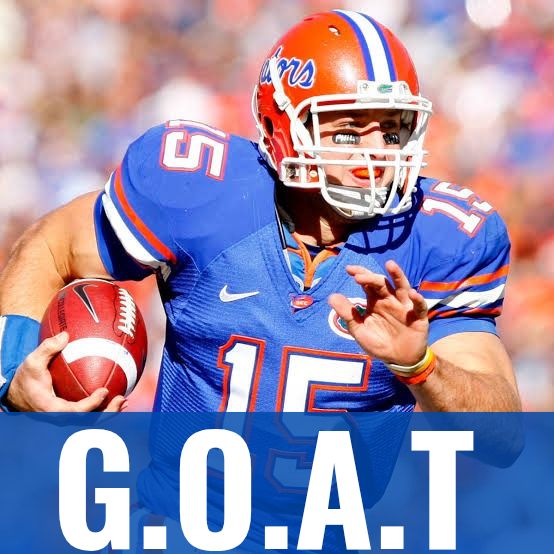
Title: Tim Tebow: The Greatest of All Time in College Football
Tim Tebow’s name has long been synonymous with college football greatness. From his electrifying performances on the field to his remarkable leadership, Tebow’s influence on the sport has transcended mere statistics and accolades. His recognition as the “Greatest of All Time” (GOAT) in college football is a testament to his unparalleled legacy, not only on the field but off it as well. As the Florida Gators’ legend tops a list that includes other giants like Herschel Walker of Georgia, Archie Griffin of Ohio State, and Earl Campbell of Texas, this achievement offers an opportunity to reflect on what made Tebow not just a great player but an icon of college football.
Timothy Richard Tebow was born on August 14, 1987, in Makati City, Philippines, to parents Bob and Pam Tebow, who were both devout Christians. His family moved back to Florida when he was young, where he quickly became known for his athletic abilities. Tebow’s high school years at Nease High School in Ponte Vedra Beach, Florida, marked the beginning of his rise to stardom. In his senior year, he led Nease to a state championship, showcasing both his passing and running abilities as a quarterback.
Despite his remarkable high school career, Tebow was not a traditional pocket passer, which led some to question whether he could excel at the collegiate level. However, the University of Florida saw something special in him. Tim Tebow’s recruitment by the Gators was a pivotal moment in the history of college football. Urban Meyer, then head coach of the Gators, made the decision to build his offense around Tebow’s unique skill set, and it quickly became clear that this was a match made in football heaven.
Tebow’s college career began in 2006, a year when the Florida Gators were already an elite program. However, Tebow’s presence took the Gators to new heights. While he didn’t start as a freshman, his impact was still undeniable. During that season, Tebow served as a backup to Chris Leak and became the first freshman to win the prestigious “ESPY Award” for Best Male Athlete, further cementing his reputation as a rising star.
The 2007 season was when Tebow’s legend truly began to take shape. He became the starting quarterback for the Gators and led them to a remarkable 9-4 record. His numbers were simply staggering: Tebow became the first player in NCAA history to pass for 20 touchdowns and rush for 20 touchdowns in a single season. That year, Tebow earned the Heisman Trophy, becoming the first sophomore ever to win the award, an honor that only added to his rapidly growing mythos in college football.
Tebow’s success continued in 2008. After a bitter defeat in the 2007 Capital One Bowl, the Gators came back with a vengeance, and Tebow led them to an undefeated season. With his leadership, Florida captured the national championship, defeating the Oklahoma Sooners in the BCS National Championship Game. Tebow’s performance was the epitome of clutch, and it solidified his legacy as one of college football’s most dominant players.
Tim Tebow’s college football career is one marked by statistics that defy belief, but it’s the intangibles—the leadership, the poise under pressure, and the relentless work ethic—that set him apart as the GOAT.
In terms of numbers, Tebow’s accomplishments are staggering. He passed for 9,286 yards and 88 touchdowns in his career, while rushing for 3,797 yards and 57 touchdowns. His combination of passing and rushing touchdowns (145) is unparalleled in the history of college football. Tebow also set multiple school and SEC records, including single-season marks for rushing touchdowns and total touchdowns.
However, numbers alone do not make a GOAT. Tebow’s leadership and ability to inspire his teammates were equally significant. Time and again, Tebow rallied his team when they faced adversity, such as during the 2008 SEC Championship Game, where his performance played a pivotal role in securing the win for Florida. His presence on the field was magnetic, and his unshakeable belief in the team and his ability to lift others was one of his defining qualities.
When discussing the greatest of all time in college football, it’s essential to understand the competition. Herschel Walker, Archie Griffin, and Earl Campbell are legends in their own right, and each had an indelible impact on the sport.
- Herschel Walker (Georgia Bulldogs): Walker is often regarded as one of the most physically gifted players to ever step onto a college football field. He rushed for over 5,000 yards in his career at Georgia and won the Heisman Trophy in 1982. Walker’s combination of speed, strength, and agility made him a dominant force in college football, and his legacy as a dual-threat running back helped pave the way for future generations of athletes.
- Archie Griffin (Ohio State Buckeyes): Griffin is the only player in college football history to win the Heisman Trophy twice, in 1974 and 1975. His consistency and excellence as a running back for the Ohio State Buckeyes are unparalleled, and his ability to excel in big games, including a national championship appearance, solidified his place as a college football legend.
- Earl Campbell (Texas Longhorns): Campbell’s brutal running style made him a fearsome force on the field. He rushed for over 4,000 yards during his college career and won the Heisman Trophy in 1977. His powerful runs and physical dominance left an indelible mark on college football, and his impact has been felt in the NFL as well.
While all of these players were incredible in their respective careers, Tim Tebow’s versatility, leadership, and ability to impact both the passing and running game set him apart. Unlike a traditional running back or quarterback, Tebow’s ability to make plays with both his arm and his legs gave him a unique edge. His leadership transcended the stat sheet, and he remains one of the most inspirational figures in the history of college football.
One of the key aspects that distinguish Tim Tebow from other legends is his impact off the field. Tebow’s faith, philanthropic efforts, and commitment to helping others have made him a role model for millions.
Tebow’s faith was a cornerstone of his identity, and he never hesitated to express his beliefs, even in the midst of national attention. His famous “John 3:16” eye-black during the 2009 BCS National Championship Game led millions to search the Bible verse, marking a cultural phenomenon. Tebow’s dedication to faith and family helped him remain grounded, even amid his rapid rise to fame.
In addition to his faith, Tebow has been heavily involved in charitable work. Through the Tim Tebow Foundation, he has worked to build hospitals, support children with special needs, and raise awareness about the importance of faith and service. Tebow’s commitment to making a difference in the world is a big part of his legacy and further solidifies his place as a true GOAT.
Tim Tebow’s recognition as the “Greatest of All Time” in college football is a fitting tribute to a player who defined an era. His combination of talent, leadership, work ethic, and impact on and off the field is unparalleled in the history of the sport. While there have been many greats in college football history, Tim Tebow’s unique contributions to the game and his lasting influence on both players and fans have solidified his place as a true legend.
As the Florida Gators’ most iconic player, Tebow’s story is one of perseverance, passion, and unparalleled greatness. His legacy is not just defined by his achievements on the football field but by the impact he has had on the culture of college football and the countless individuals he has inspired throughout his career. Tim Tebow is, without question, the greatest of all time.





